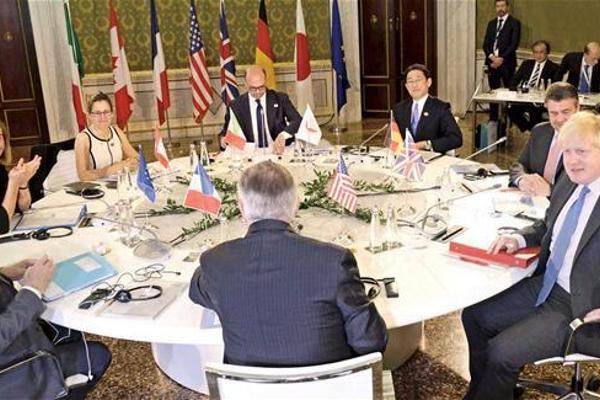West says no future with Assad, Russia hits back
LUCCA, Italy/MOSCOW


Al-Assad should not be part of Syria’s future, U.S. Secretary of State Rex Tillerson said, but G-7 allies rejected a call for new sanctions on Damascus and its key ally Moscow.
Washington has stepped up the pressure on Russia to rein in al-Assad after a suspected chemical weapons attack on a rebel-held Syrian town killed at least 87 civilians on April 4 and triggered retaliatory U.S. missile strikes on a Syrian air base located in the north of the country, Shayrat, early on the morning of April 7.
The Russian General Staff said the Syrian government was willing to let international experts examine its military base for signs of chemical weapons.
As G-7 foreign ministers urged a diplomatic push to end the six-year conflict and create a lasting peace for a unified Syria, Tillerson said: “Our hope is Bashar al-Assad will not be part of that future.”
This statement was also repeated by French Foreign Minister Jean-Marc Ayrault. The ministers agreed that “no future in Syria is possible with Bashar al-Assad,” Ayrault said.
“To be clear, our military action was a direct response to the Assad regime’s barbarism,” Tillerson said right before flying to Moscow to attend a meeting with his Russian counterpart, Sergei Lavrov, on April 12.
“The United States’ priority in Syria and Iraq remains the defeat of ISIS,” he added, referring to the Islamic State of Iraq and the Levant (ISIL).
A few hours after Tillerson’s remarks, Russian President Vladimir Putin said Russia had information that the U.S. was planning to launch new missile strikes on Syria and that there were plans to fake chemicals weapons attacks there.
Standing alongside Italian President Sergio Mattarella who was in Moscow for talks, Putin, when asked by a reporter if he expected more U.S. missile strikes on Syria, said: “We have information that a similar provocation is being prepared ... in other parts of Syria including in the southern Damascus suburbs where they are planning to again plant some substance and accuse the Syrian authorities of using [chemical weapons].”
He did not offer any proof for that assertion.
Russia has defended the Syrian government, a staunch ally, against U.S. allegations it was behind the nerve gas attack in Syria’s Idlib province last week which killed scores, saying there is no evidence to underpin such an allegation.
Meanwhile, the Russian Foreign Ministry said April 11 that Lavrov would host three-way talks with his counterparts from Syria and Iran, Syrian Foreign Minister Walid Muallem and Iranian Foreign Minister Mohammad Javad Zarif, consecutively, this week.
Meanwhile, the G-7 ministers failed to agree on whether fresh sanctions should be imposed on Damascus and Moscow.
“At the moment there is no consensus on new sanctions as an effective instrument,” Italian Foreign Minister Angelino Alfano said, after his British counterpart, Boris Johnson, had raised the issue.
But after talks in the Tuscan city, German Foreign Minister Sigmar Gabriel said: “All the G-7 states want to avoid a military escalation and want a political solution without a new spiral of violence. We want to bring Russia around to supporting the political process for a peaceful resolution of the Syrian conflict.”
On April 10, White House spokesman Sean Spicer indicated that Washington could also retaliate if Syria uses “barrel bombs” – oil drums packed with explosives dropped from aircraft.
“When you watch babies and children being gassed, and suffer under barrel bombs, you are instantaneously moved to action,” he said. “I think this president’s made it very clear that if those actions were to continue, further action will definitely be considered by the United States.”
Retaliating for barrel bombs would require a major shift in U.S. policy since rebels say the weapons are used almost daily.
The Syrian Observatory for Human Rights, a Britain-based monitoring group, said Syrian warplanes dropped barrel bombs on rebel-held areas of Hama province on April 11. Syria has always denied using barrel bombs, though their use has been widely recorded by U.N. investigators. A source in the Syrian military denied it used them on April 11.
U.S. Secretary of Defense James Mattis claimed in a statement on April 10 that the U.S. air strike on Syria’s Shayrat Air Base on April 7 destroyed about 20 percent of the Syrian government’s operational aircraft.
“The Syrian government has lost the ability to refuel or rearm aircraft at Shayrat airfield and at this point, use of the runway is of idle military interest,” Mattis said, describing the strike as a “measured response.”
